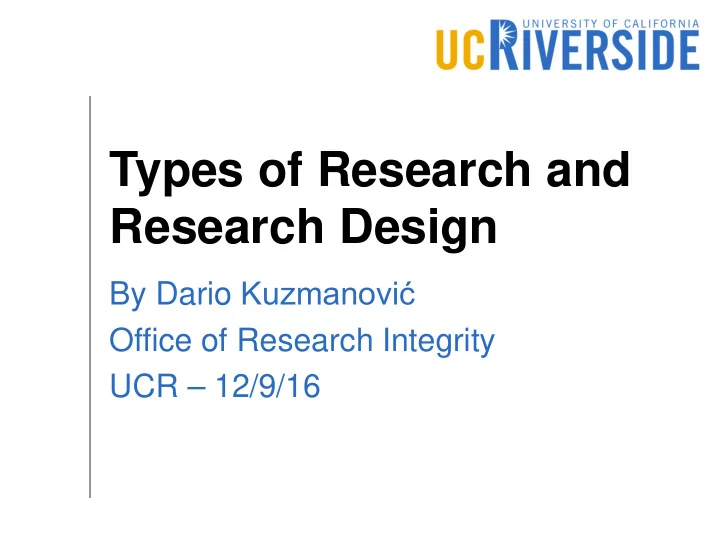

Types of Research and Research Design By Dario Kuzmanović Office of Research Integrity UCR – 12/9/16
Research Step into the unknown… Process of discovering new knowledge Attempt to advance current information Fed definition of research with people: “A systematic investigation designed to develop or contribute to generalizable knowledge”
The scientific method Hypothesis : Informed and educated prediction or explanation about something
Research design Kind of like a recipe In a study, we call it a ‘research protocol’ Research design is the glue that holds the project in place Sets up the research, shows how all parts work together to address the question under study Depends on the type of question, population, resources, time, etc.
Types of research - I Qualitative Looking at issues that are difficult or impossible to express through numbers Look at why and how of decision making For example, beliefs, meanings, attitudes, etc. Observations, interviews, stories, documents, reports, case study, etc. PRO: we can study complex experiences CON: open to interpretation
Types of research - II Quantitative Looking at issues by systematic investigation using numbers and mathematical models Look at what, where, and when Experiments, quasi-experiments, correlational, etc. PRO: we can measure things and analyze data CON: large numbers needed and often not done in ‘natural settings’ Because neither is perfect, researchers often try to mix elements of both
Rules and regulations By Dario Kuzmanović Office of Research Integrity UCR – 12/9/16
Reasons History of research ethics abuses Risk of harm Difficulty of understanding research protocols Undue inducement Risk of exploitation Dependence of public trust Professional ethics for researchers Uncertainty
Institutional Review Boards - IRB Independent group of people established to approve and review research involving human subjects Required for all research where UCR faculty are involved Has community members – non-scientists, unaffiliated to UCR – as well as researchers IRB facilitates ethical research and ensures that risks are minimized
IRBs Research is conducted in accordance with federal, institutional and ethical guidelines Researchers may not begin until they have approval Any change must have prior IRB approval Can take anywhere from 2 - 6 weeks on average depending on complexity Complaints regarding research can be submitted to the IRB
When can an IRB approve? Good research design No unnecessary risks Risks are reasonable Selection is equitable Informed consent obtained & documented Privacy and confidentiality protected Other approvals may be necessary Funding, grants & contracts, biosafety, conflict of interest, etc.
IRB limits Only review “human subjects research” as defined in the regulations Do not have oversight over: Mentoring Publication Research misconduct Findings Program evaluation, quality improvement, and everything else outside of that definition
More than meets the IRB… 5. IRB review
Ethical considerations* 1 st - What is a ‘community’? Confidentiality in communities Managing multiple roles/boundaries Learning about sensitive topics Recruitment
Confidentiality Challenges and limits to maintaining confidentiality Data collection, analysis and dissemination When community members are named
Managing multiple roles / boundaries Identify and discuss forms of power within the team, between the team and the community and with the CBO Regular meetings to outline the roles, possible conflicts, and strategies for managing these It’s important to maintain roles and boundaries (‘hats’)
Sensitive topics Support for participants following disclosure of sensitive or illegal information Protecting the wellbeing of participants and communities Working with the IRB to develop strategies to protect sensitive data Framing sensitive research findings
Recruitment Developing effective inclusion and exclusion Recruiting through organizations and service providers Ethical issues when recruiting through peers What are effective recruitment materials and strategies
Additional resources UCR ORI website: http://research.ucr.edu/ORI.aspx Research participant/subject resource – more info on IRBs and research in general (Not community- engagement specific) Two IRBs at UCR – IRB-SB & IRB-Clin drugsCBRethics.com – Resource for those who use drugs and are part of CBPR Search ‘Protecting Human Research Participants’ – free tutorial online http://www.hivethicscbr.com/
Recommend
More recommend